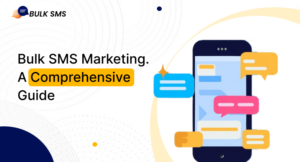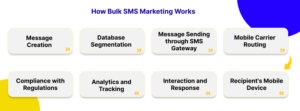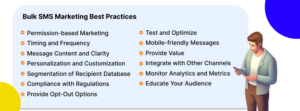
In the dynamic landscape of digital marketing, businesses are constantly seeking innovative ways to market to their audience effectively. One such powerful marketing technique that has emerged in recent years is Bulk SMS Marketing. In this comprehensive guide, we’ll delve into the essence of Bulk SMS Marketing, exploring its definition, advantages, working mechanisms, use cases, best practices, challenges, and future trends.
Understanding Bulk SMS Marketing
Bulk SMS Marketing refers to the practice of sending a large volume of text messages to a targeted audience simultaneously. This marketing strategy utilizes short message service (SMS) technology to deliver concise and impactful messages to mobile phone users. The messages are often promotional, informative, or alert-based, aiming to engage the audience and achieve specific business objectives.
Imagine a shop owner wants to tell their audience about a fantastic sale they’re having. Instead of calling each person or sending individual messages, they use a special service that helps them send out lots of messages in one go. This way, they can reach many people quickly and share their exciting news. This is the basic concept behind Bulk SMS Marketing.
Considering the integration of Bulk SMS Messaging in your Marketing approach? Book a free consultation with our Bulk SMS Experts.
Key Components of Bulk SMS Marketing
- Sender ID: It’s like your friend signing their name at the end of the message, so you know it’s from them.
- Message Content: Just like your friend writing a short and sweet note, businesses keep their messages brief and to the point so you can quickly get what they’re saying.
- Recipient Database: Your friend has a list of all their friends they want to tell about the sale. They might organize this list to make sure they’re telling the right people about the right stuff.
- SMS Gateway: Think of this as the magic postman who helps your friend deliver all those messages to everyone on their list.
Advantages of Bulk SMS Marketing
Bulk SMS Marketing offers numerous advantages that make it a powerful and efficient tool for businesses seeking to connect with their audience. Here’s a comprehensive overview of its key advantages:

Cost-Effectiveness:
- Bulk SMS is a budget-friendly marketing option, especially when compared to traditional advertising methods.
- Businesses can reach a large audience with minimal expenditure on messaging costs.
Wide Reach and Instant Delivery:
- With the widespread use of mobile phones, bulk SMS ensures instant and direct communication with recipients.
- Messages are delivered almost instantly, allowing businesses to convey time-sensitive information promptly.
High Open Rates:
- SMS messages have exceptionally high open rates compared to other communication channels.
- The majority of recipients are likely to read the messages, increasing the chances of the intended message being received.
Personalization and Targeting:
- Businesses can personalize messages based on customer preferences, demographics, or past interactions.
- Targeted messaging enhances engagement, as recipients receive content that is relevant to their interests.
Trackability and Analytics:
- Advanced analytics tools enable businesses to track the success of their SMS campaigns.
- Metrics such as delivery rates, open rates, and response rates provide valuable insights for optimizing future campaigns.
Time-Sensitive Promotions:
- Bulk SMS is ideal for time-sensitive promotions and offers, such as flash sales or limited-time discounts.
- Businesses can create a sense of urgency and encourage immediate action from recipients.
Bulk SMS Marketing provides businesses with a versatile and impactful means of communication, offering cost-effective, targeted, and real-time engagement with their audience. These advantages contribute to its popularity as a strategic component of modern marketing campaigns.
Also read: Bulk SMS Marketing Benefits for Businesses
How Bulk SMS Marketing Works
Bulk SMS Marketing operates through a streamlined process that allows businesses to send a large volume of text messages to a targeted audience. Here’s an overview of how Bulk SMS Marketing works:

- Message Creation: Businesses start by creating the content of their SMS messages. The content is crafted to be concise, engaging, and relevant to the target audience. Due to the character limit of SMS, messages are kept short and to the point.
- Database Segmentation: The recipient database is organized and segmented based on specific criteria. Businesses may categorize recipients by demographics, location, preferences, or past interactions. Segmentation enables targeted messaging, ensuring that recipients receive content that is most relevant to them.
- Message Sending through SMS Gateway: Once the messages are created and the recipient database is segmented, businesses use an SMS gateway to send out the messages. An SMS gateway is a platform or service that facilitates the sending and receiving of SMS messages. It acts as the intermediary between the business and mobile carriers.
- Mobile Carrier Routing: The SMS gateway sends the messages through the mobile carrier networks. The mobile carriers then route the messages to the recipients based on their phone numbers. This process involves identifying the recipient’s carrier and directing the message accordingly.
- Recipient’s Mobile Device: The messages are delivered to the recipients’ mobile devices. When the SMS reaches the recipient’s phone, it appears as a text message. The recipient can then open and read the message on their device.
- Interaction and Response: Recipients have the option to interact with the message by taking a desired action. This could include clicking on links, responding to offers, or following instructions provided in the SMS.
- Analytics and Tracking: Businesses utilize analytics tools to track the performance of their Bulk SMS campaigns. Metrics such as delivery rates, open rates, and response rates provide valuable insights into the effectiveness of the campaign. This data is crucial for optimizing future campaigns.
- Compliance with Regulations: It’s important for businesses to adhere to local and international regulations governing SMS marketing. This includes obtaining consent from recipients before sending messages and providing clear opt-out mechanisms to ensure compliance and respect for user preferences.
In essence, Bulk SMS Marketing works by leveraging the simplicity and immediacy of text messaging to communicate directly with a large audience. The process involves careful planning of message content, segmentation of the recipient database, utilization of SMS gateways for message delivery, and tracking of campaign performance for continuous improvement. This efficient and targeted approach makes Bulk SMS Marketing a valuable tool in the modern marketing landscape.
Curious about the impact of Bulk SMS on your marketing? Connect with our experts for a personalized, no-obligation consultation.
Bulk SMS Marketing Best Practices
Effective Bulk SMS Marketing goes beyond simply sending messages in volume, it involves thoughtful planning, strategic execution, and a focus on building positive relationships with your audience. Here’s an elaboration on best practices in Bulk SMS Marketing:

- Permission-based Marketing: Obtain explicit consent from recipients before sending them SMS messages. This ensures that your messages are welcomed and reduces the risk of being perceived as spam.
- Timing and Frequency: Respect your audience’s time by sending messages at appropriate times. Avoid sending messages too early in the morning or too late at night. Additionally, be mindful of the frequency to prevent annoyance and potential opt-outs.
- Message Content and Clarity: Craft clear, concise, and compelling messages. Clearly communicate the purpose of the message and provide value to the recipient. Avoid ambiguity and use language that resonates with your target audience.
- Personalization and Customization: Personalize messages whenever possible. Use the recipient’s name and tailor the content based on their preferences or past interactions. Customization enhances the user experience and increases engagement.
- Segmentation of Recipient Database: Segment your recipient database based on relevant criteria such as demographics, location, or behavior. This allows you to send targeted messages to specific groups, increasing the relevance of your communications.
- Compliance with Regulations: Adhere to local and international regulations governing SMS marketing. Ensure that you have the necessary permissions to send messages, provide opt-out mechanisms, and stay informed about any changes in regulations.
- Provide Opt-Out Options: Include clear and easy-to-use opt-out options in your messages. Respecting the preferences of recipients who no longer wish to receive your messages is crucial for maintaining a positive brand image.
- Test and Optimize: Regularly test different aspects of your SMS campaigns, including message content, timing, and calls-to-action. Use A/B testing to identify what resonates best with your audience and continually optimize your approach based on the results.
- Provide Value: Ensure that your messages provide value to the recipients. Whether it’s exclusive offers, useful information, or personalized recommendations, delivering value enhances the likelihood of positive responses.
- Integrate with Other Channels: Integrate your Bulk SMS campaigns with other marketing channels for a cohesive strategy. Ensure consistency in messaging across platforms to create a unified brand experience.
- Monitor Analytics and Metrics: Use analytics tools to monitor the performance of your campaigns. Track delivery rates, open rates, click-through rates, and other relevant metrics. Analyzing this data provides insights for refining your future SMS marketing strategies.
- Educate Your Audience: Clearly communicate the benefits of receiving your SMS messages. Let your audience know what kind of content to expect and how it will add value to their experience.
By incorporating these best practices into your Bulk SMS Marketing strategy, you can enhance the effectiveness of your campaigns, build stronger connections with your audience, and ultimately achieve your marketing goals.
Get a free consultation with our Bulk SMS experts to know more about Bulk SMS Marketing and how it can help you achieve your marketing goals.
Bulk SMS Marketing Challenges
While Bulk SMS Marketing is a powerful and direct communication tool, it comes with its set of challenges. Being aware of these challenges is crucial for businesses to navigate potential pitfalls and optimize their SMS campaigns effectively. Here’s an elaboration on the challenges in Bulk SMS Marketing:

- Overcoming Message Filters: SMS messages are subject to filtering mechanisms that aim to identify and block spam. Overcoming these filters requires businesses to adhere to best practices, obtain consent, and ensure the relevance of their messages.
- Opt-Out Mechanisms: Providing effective opt-out mechanisms is a regulatory requirement, but ensuring that the process is user-friendly and works seamlessly is a challenge. Businesses must make it easy for recipients to opt out to maintain compliance and goodwill.
- Managing Unsubscribers: Handling individuals who choose to unsubscribe from SMS campaigns requires effective management. Businesses should promptly remove unsubscribed numbers from their databases and respect the preferences of users who opt out.
- Keeping Up with Regulations: SMS marketing is subject to various regulations, which may vary across regions. Staying informed about and compliant with these regulations can be challenging but is essential to avoid legal issues.
- Message Content and Clarity: Crafting concise and clear messages within the character limit of SMS can be challenging. Businesses need to convey their message effectively while avoiding ambiguity and ensuring that the content is compelling.
- Timing and Frequency Issues: Determining the optimal timing for sending SMS messages and managing the frequency of communication can be tricky. Sending messages at inappropriate times or too frequently may lead to irritation and increased opt-out rates.
- Mobile Carrier Limitations: Different mobile carriers may have varying restrictions on the length and content of SMS messages. Businesses need to be aware of these limitations to ensure that their messages are delivered accurately and comprehensively.
Navigating these challenges requires a strategic and thoughtful approach to Bulk SMS Marketing. By addressing privacy concerns, staying compliant with regulations, optimizing message content, and adapting to user preferences, businesses can overcome obstacles and build successful SMS campaigns.
Future Outlook for Bulk SMS Marketing
As technology and consumer behaviors continue to evolve, the future outlook for Bulk SMS Marketing holds several exciting possibilities and trends. Here’s an elaboration on what we can anticipate in the coming years:
- Integration with Other Marketing Channels: The future will likely see increased integration of Bulk SMS Marketing with other digital marketing channels. Businesses will seek to create seamless and synchronized multichannel campaigns, combining the strengths of SMS with email marketing, social media, and more.
- Advanced Personalization Techniques: Personalization will take center stage with the integration of advanced technologies like artificial intelligence (AI) and machine learning (ML). Businesses will leverage data analytics to deliver highly personalized and contextually relevant SMS messages, increasing engagement and conversion rates.
- Rich Media and Multimedia Content: With improvements in mobile technology, the future may see the integration of rich media and multimedia content within SMS messages. Businesses could include images, videos, and interactive elements to create more engaging and visually appealing messages.
- Geo-targeted and Hyper-local Campaigns: Location-based targeting will become more prevalent, allowing businesses to send SMS messages based on the recipient’s geographic location. Hyper-local campaigns can provide real-time and relevant information, such as local promotions or event details.
- Evolving Regulatory Landscape: The regulatory landscape for SMS marketing is likely to continue evolving. Businesses will need to stay abreast of changes in privacy laws and messaging regulations to ensure compliance and maintain the trust of their audience.
- Environmental Sustainability: Businesses may explore environmentally sustainable practices in SMS marketing. Strategies like encouraging digital receipts via SMS instead of paper and minimizing unnecessary messaging may align with eco-friendly initiatives.
The future outlook for Bulk SMS Marketing is marked by technological advancements, increased personalization, and a commitment to user consent and privacy. Businesses that embrace these trends and adapt to evolving consumer expectations are poised to harness the full potential of Bulk SMS Marketing in the years to come.
Bulk SMS Marketing enables businesses to communicate directly with their target audience, leveraging the immediacy and personal nature of text messages to achieve marketing and communication goals. It is a versatile and cost-effective tool that can be employed in various industries and for a wide range of purposes.
